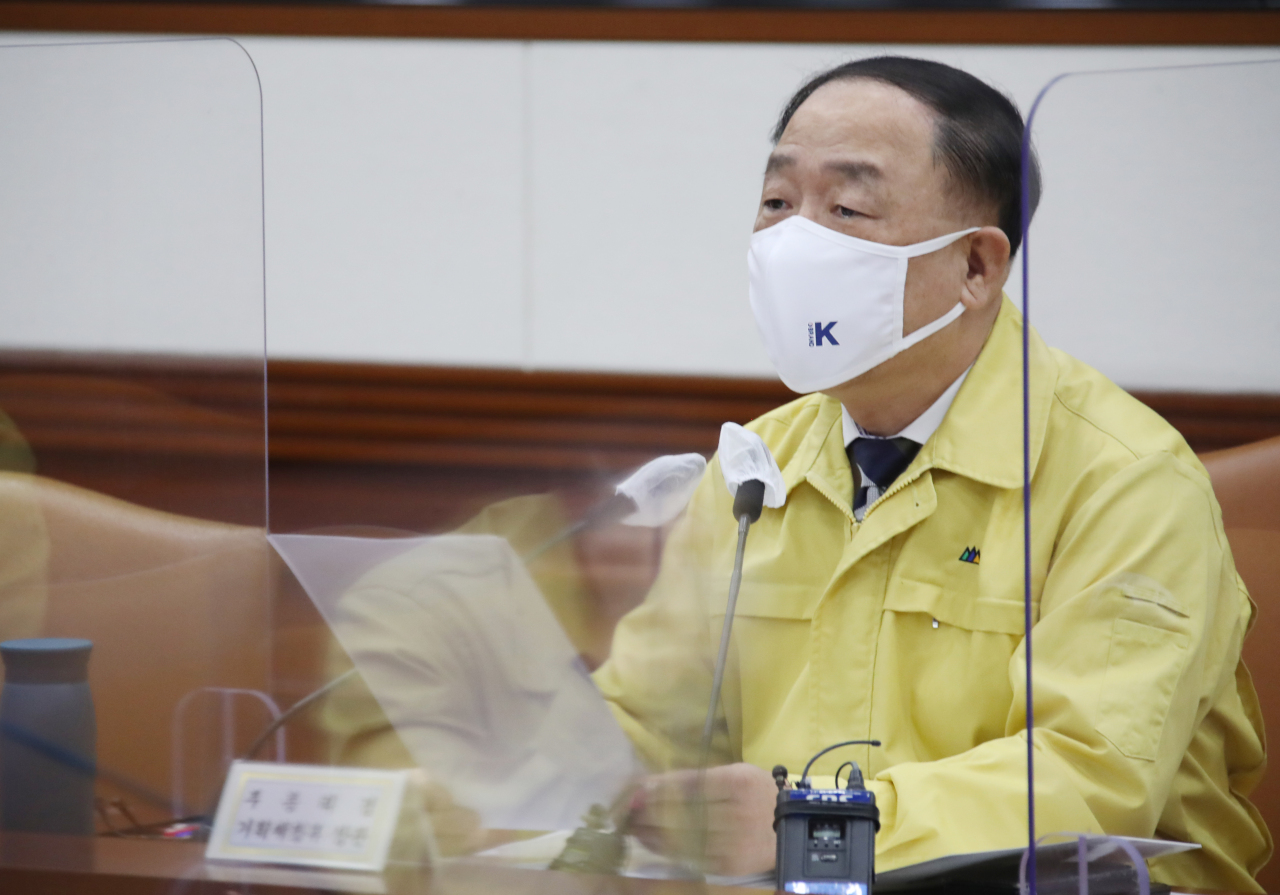With tax surplus, finance ministry allocates W10tr to support micro businesses
By Kim Yon-sePublished : Nov. 23, 2021 - 15:50

SEJONG -- The Finance Ministry has unveiled its plan to support microbusiness owners, including the self-employed, in use of tax revenue surplus and the national budget.
This is regarded as a sort of bailout for small businesses, which were severely hit by the pandemic in terms of sales and financial conditions. While they will have the opportunity of taking out state-led loans on low rates, the government’s support package does not include cash grants.
“The support scale would reach 10.8 trillion won ($9.1 billion),” Deputy Prime Minister and Finance Minister Hong Nam-ki said Tuesday.
While the surplus in tax revenue came to 19 trillion won this year, 7.6 trillion won -- 40 percent of the sum -- will initially be allocated to local governments nationwide under relevant laws.
Hong said that “of the remaining 11.4 trillion, 5.3 trillion won will be used for small-business owners.” He added the other 6.1 trillion of the surplus would be allocated to payment of sovereign debt or other purposes.
As for the bailout for microbusinesses, Hong clarified that the ministry will mobilize additional funds totaling 5.5 trillion won from the existing national budget, alongside the planned 5.3 trillion won from the tax revenue surplus. This will make up a support package of 10.8 trillion won.
One of the detailed plans is to issue state loans at an annual rate of 1 percent with a ceiling of 20 million won per business. Others are slashing interest rates on outstanding loans, issued to the tourism and lodging industries, by up to 1 percentage point, and offer a grace period of 12 months for principle redemption for the two tough-hit sectors.
Meanwhile, the Finance Ministry also announced a plan to reinvigorate the private consumption by extending the period of offering “lowered” specific consumption tax on passenger cars by six more months -- from the former December 2021 in expiry to June 2022.
When consumers purchase passenger cars, they have to pay specific consumption, education and value added taxes. The consumption tax has been cut temporarily -- from the original 5 percent of the automobile wholesale price to 3.5 percent.
Some, 1.3 trillion won of the state budget will be allocated to the employment segment, amid mounting worries over the situation that the state-led payout funds for the jobless might be depleted in the coming years or months. An unprecedented surge has been seen in the number of people who have lost jobs and applied for unemployment benefits since early 2020, amid the ongoing pandemic.
This is regarded as a sort of bailout for small businesses, which were severely hit by the pandemic in terms of sales and financial conditions. While they will have the opportunity of taking out state-led loans on low rates, the government’s support package does not include cash grants.
“The support scale would reach 10.8 trillion won ($9.1 billion),” Deputy Prime Minister and Finance Minister Hong Nam-ki said Tuesday.
While the surplus in tax revenue came to 19 trillion won this year, 7.6 trillion won -- 40 percent of the sum -- will initially be allocated to local governments nationwide under relevant laws.
Hong said that “of the remaining 11.4 trillion, 5.3 trillion won will be used for small-business owners.” He added the other 6.1 trillion of the surplus would be allocated to payment of sovereign debt or other purposes.
As for the bailout for microbusinesses, Hong clarified that the ministry will mobilize additional funds totaling 5.5 trillion won from the existing national budget, alongside the planned 5.3 trillion won from the tax revenue surplus. This will make up a support package of 10.8 trillion won.
One of the detailed plans is to issue state loans at an annual rate of 1 percent with a ceiling of 20 million won per business. Others are slashing interest rates on outstanding loans, issued to the tourism and lodging industries, by up to 1 percentage point, and offer a grace period of 12 months for principle redemption for the two tough-hit sectors.
Meanwhile, the Finance Ministry also announced a plan to reinvigorate the private consumption by extending the period of offering “lowered” specific consumption tax on passenger cars by six more months -- from the former December 2021 in expiry to June 2022.
When consumers purchase passenger cars, they have to pay specific consumption, education and value added taxes. The consumption tax has been cut temporarily -- from the original 5 percent of the automobile wholesale price to 3.5 percent.
Some, 1.3 trillion won of the state budget will be allocated to the employment segment, amid mounting worries over the situation that the state-led payout funds for the jobless might be depleted in the coming years or months. An unprecedented surge has been seen in the number of people who have lost jobs and applied for unemployment benefits since early 2020, amid the ongoing pandemic.












![[Today’s K-pop] BTS pop-up event to come to Seoul](http://res.heraldm.com/phpwas/restmb_idxmake.php?idx=644&simg=/content/image/2024/04/17/20240417050734_0.jpg&u=)




![[KH Explains] Hyundai's full hybrid edge to pay off amid slow transition to pure EVs](http://res.heraldm.com/phpwas/restmb_idxmake.php?idx=652&simg=/content/image/2024/04/18/20240418050645_0.jpg&u=20240419100350)

![[Today’s K-pop] Zico drops snippet of collaboration with Jennie](http://res.heraldm.com/phpwas/restmb_idxmake.php?idx=642&simg=/content/image/2024/04/18/20240418050702_0.jpg&u=)